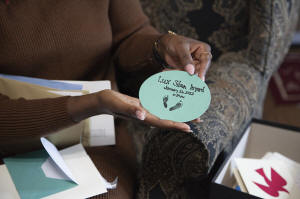Arkansas victims of mortuary theft scheme inspire push for law banning
sale of human remains
 Send a link to a friend
Send a link to a friend
 [February 20, 2025]
By ANDREW DeMILLO [February 20, 2025]
By ANDREW DeMILLO
LITTLE ROCK, Ark. (AP) — A year had passed since Doneysha Smith suffered
a stillbirth and the memories of her loss lingered in 2023. The cremated
remains of her child were kept in a tiny urn in her house and on a
necklace she wore, and a memorial service had marked her family's loss
with mourners releasing blue, white and yellow balloons into the sky.
But the FBI had reached out to the Arkansas woman with shocking news:
The urn and necklace didn't contain her child's ashes and the body had
been sold as part of a multistate scheme that bought and sold human
remains.
“My son wasn't even able to get to his final resting place,” Smith said
during an interview at her home in Sherwood, located outside Little
Rock.
Now Smith and her mother are advocating for a new law in Arkansas that
would make selling human remains that were supposed to be cremated or
buried a felony. The proposal is called Lux's Law, after the name she
gave her child. The Senate passed the measure this week and it's pending
before a House panel.
Candace Chapman Scott, a former mortuary worker, pleaded guilty in
federal court last year to charges that she sold 24 boxes of stolen body
parts and fetal remains to a Pennsylvania man for nearly $11,000. The
remains included Lux's body.
Scott, who was sentenced last month to 15 years in federal prison, was
among several charged in what prosecutors have called a nationwide
scheme to steal and sell human body parts from an Arkansas mortuary and
Harvard Medical School.

State Sen. Fred Love, a Democrat from Little Rock, said he introduced
the measure after speaking with Smith's mother, Lynnell Logan, at a
community event and learning there weren't any state laws specifically
barring the sale of stolen human remains.
Love said such a law is needed at the state level, noting how the scheme
included people in multiple states exchanging messages and pictures on
Facebook about the body parts being sold. Love's proposal calls for a
fine of up to $10,000 and between three and 10 years in prison for
anyone convicted.
“This is another form of trafficking,” Love said. “We must do something
to stop it.”
Smith and her mother said the news that Lux's body had been sold and
that the ashes they received weren't his reopened wounds. To this day,
the family doesn't know whether the ashes they received were human
remains, Logan said.
[to top of second column]
|

Doneysha Smith shows the footprints of her 18-week-old baby Lux
Siloam at her home in Sherwood, Arkansas, Tuesday, Feb. 11, 2025.
After being stillborn at 18 weeks, Lux's body was stolen and sold to
traffickers in two states, prompting an FBI investigation. A
proposed law, known as Lux's Law, would prohibit the sale of dead
bodies that were intended to be cremated or buried and establish
penalties in Arkansas. (AP Photo/Katie Adkins)

“It was like reliving his passing all over again and then you're
thinking about how he was shipped everywhere, and who all handled
him,” Logan said. “Who would do this to a baby?”
Only eight states broadly prohibit the sale of human remains,
according to Tanya Marsh, a law professor at Wake Forest University
School of Law who is an expert in laws regarding human remains.
The Arkansas proposal isn't as broad as those measures since it only
applies to bodies that were intended to be cremated or buried.
Arkansas already has laws prohibiting the “abuse of a corpse.”
Minnesota last year enacted a law making it a felony to buy and sell
human bones, and the lawmaker behind the measure cited examples of
oddities shops and websites selling human skulls.
Many people are surprised when they learn that there's a private
market for human remains, Marsh said.
“It’s such a shadow area of commerce that most of us don't have
exposure to this,” Marsh said.
Lux's remains have been returned to Smith, and his ashes now are in
a tiny urn inside a lantern that sits on the mantle.
“When tomorrow starts without me don't think we're far apart for
every time you think of me I'm right here in your heart,” the glass
door of the lantern read.
Smith also has a gold necklace that contains some of his ashes, and
she keeps it on a teddy bear in her bedroom when she's not wearing
it. The FBI returned Lux's body to the family the same day as last
year's eclipse — something the family views as symbolic.
With the legislation, Smith said her child is living up to the name
her family gave him after her stillbirth — Lux Siloam. “Lux” is
Latin for “light” and “Siloam” is Greek for “sent.”
“Even after passing away, he is still working and kind of moving
things around and shining light on something so dark that people
need to be aware of,” Smith said.
All contents © copyright 2025 Associated Press. All rights reserved |